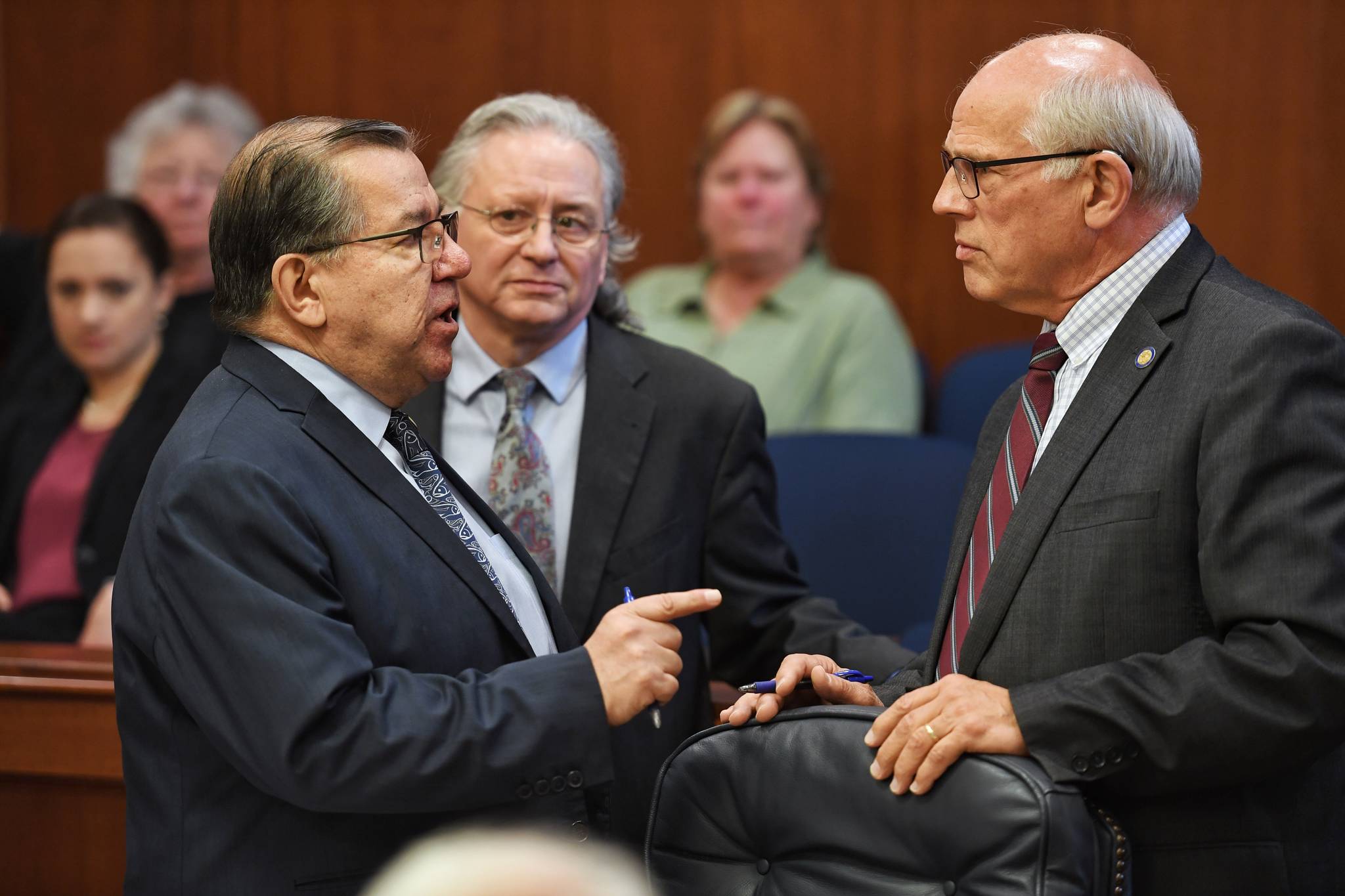Alaska’s lawmakers are going back to school.
An hour after the Legislature wrapped up its first special session, Gov. Mike Dunleavy called the Legislature into another session — one that will begin July 8 at Wasilla Middle School. The session is specifically for legislators to set an amount for this year’s Permanent Fund Dividend, according to Dunleavy’s announcement.
During the 29-day special session, the Legislature passed an operating budget that is $190 million lower than last year’s budget and passed a crime bill that increases sentences for many crimes. Lawmakers were unable to reach an agreement on the amount of the PFD, with both houses split on the issue. Dunleavy has said he will veto any dividend legislation that does not include a $3,000 PFD for this year. A working group of four senators and four representatives began meeting this week to start drafting recommendations for the Legislature on the future of the dividend.
[Ferry cuts in Legislature budget are heavy, but could have been worse]
Legislators will also have to reach an agreement about how to fund the state’s capital budget, which allocates money for infrastructure projects around the state. The House voted Wednesday to approve the overall budget, but did not get enough votes to approve funding from the Constitutional Budget Reserve. Three-quarters of the Legislature must vote to pull from that fund, and the House fell short of that, as the vote was 23-14 in favor.
Legislators, as well as municipal leaders throughout the state, are in wait-and-see mode as they await possible governor vetoes on the operating budget. Speaker of the House Bryce Edgmon told media members Thursday that Dunleavy’s vetoes on the operating budget will affect how the Legislature can fund the capital budget.
“We’ve not had a lot of communication with the governor or his staff,” Edgmon said, “so it’s been difficult at times to sort of put these pieces into place.”
Concerns about Wasilla
A legislative session has not happened outside of Juneau or Anchorage, and many in the Legislature are concerned about the logistics of holding a session in Wasilla.
The main argument against having a session in Wasilla is that the city is not designed to house a Legislature. In a recent interview, Sen. Gary Stevens, R-Kodiak, said sessions should be held in Juneau because Juneau has the Capitol building and office space for lawmakers and their staff. Stevens said he was particularly concerned about Gavel to Gavel, a service through 360 North that live streams and archives floor sessions and committee hearings.
“The biggest and most important thing to me is Gavel to Gavel,” Stevens said. “If we are here in the Capitol, Gavel to Gavel will cover us and the public will know what’s going on. If we go to Anchorage or Wasilla, we’re not going to have Gavel to Gavel.”
The Legislative Affairs Agency put together a six-page list of logistical concerns about a session at Wasilla Middle School in response to the governor’s proposal. In that response, LAA states that Gavel to Gavel would not be at the session in Wasilla under the governor’s proposal.
The list was supplied to media members recently. Concerns include the lack of a setup for useful cameras and recording devices, referring back to poor recordings from a 2015 special session in Anchorage.
“The historical record and the people of Alaska deserve better than the spotty recordings of the 2015 Anchorage special session,” the memo states.
The governor’s proposal includes that his office would have access to all of the school’s security cameras, according to the LAA response, which LAA stated is “not appropriate.” There are not sufficient sound systems for floor sessions, no setup for people to be able to teleconference into meetings, not enough plug-ins for phones and computers, poor cell and internet service, and there’s a lack of reasonable lodging nearby, according to LAA’s response.
The response also includes a line saying there’s a way for the Legislature to get out of this.
“The Legislature has a remedy if it does not agree with the location designated by the governor — the Legislature can adjourn from the special session without taking action,” the response states.
Dunleavy has asserted that having a session on the road system will result in more face-to-face interaction between constituents and legislators. Dunleavy’s family has lived in Wasilla since 2004, according to his biography on the state’s website, and was a state senator representing Wasilla.
One legislator who agrees with him is Rep. David Eastman, R-Wasilla.
“The people of Alaska feel betrayed and alienated by those in Juneau,” Eastman wrote in an email to the Empire. “It is important that the legislature conduct business on the road system as a step towards restoring rapport with the people and allowing the 700,000 Alaskans who don’t live in the Juneau Borough the opportunity to interact with their legislators in person during the legislative session.”
[Legislators could change law to collect per diem, despite not finishing on time]
Senate President Cathy Giessel, R-Anchorage, told the Empire recently that when the Legislature held a session in Anchorage in 2015, not many members of the public came. Sen. Jesse Kiehl, D-Juneau, said in an interview that even if people did show up, their opinions might not sway legislators, who are elected to represent their own communities.
“None of my Anchorage colleagues vote based on the Juneau residents who have a protest on the steps, and none of my Nome or Bethel colleagues will vote based on a protest in Wasilla,” Kiehl said. “We’ll represent our constituents.”
• Contact reporter Alex McCarthy at amccarthy@juneauempire.com. Follow him on Twitter at @akmccarthy.

